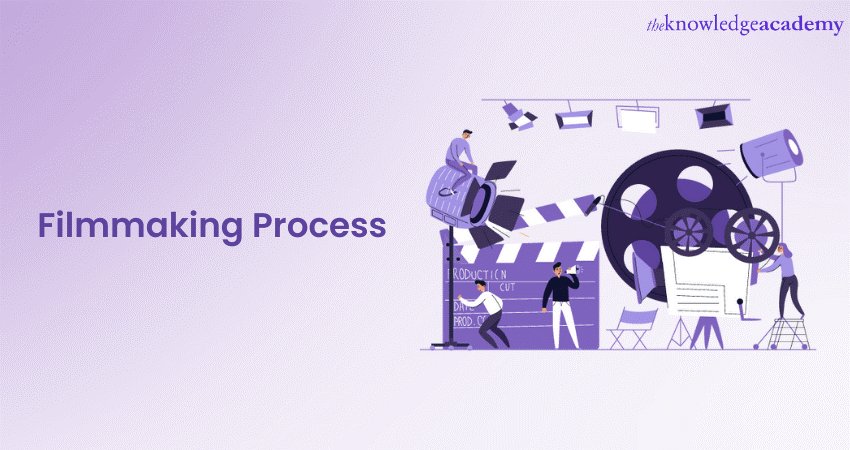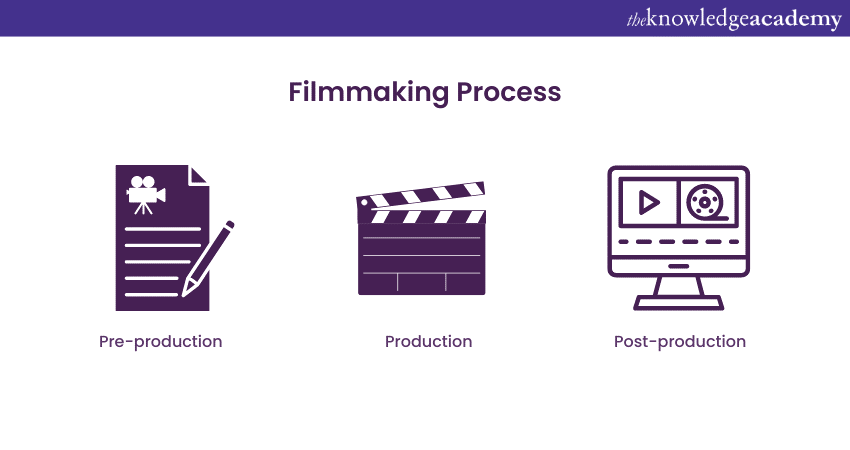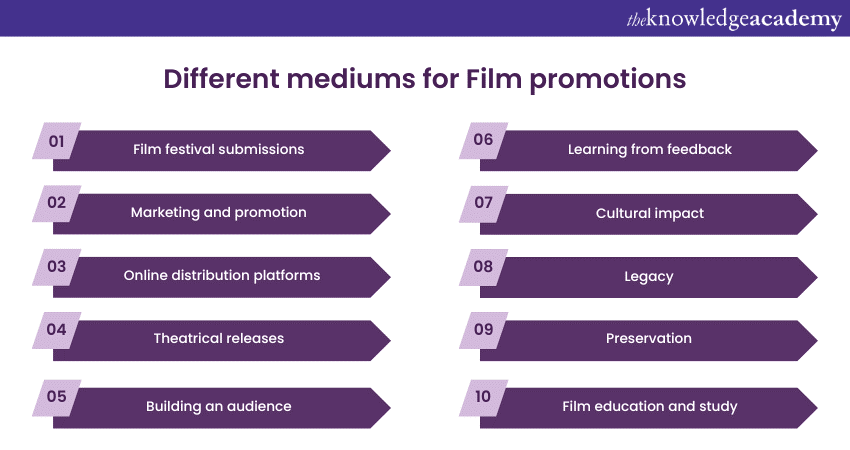We may not have the course you’re looking for. If you enquire or give us a call on +30 2111995372 and speak to our training experts, we may still be able to help with your training requirements.
We ensure quality, budget-alignment, and timely delivery by our expert instructors.

Are you willing to enter the Filmmaking industry, or someone keen to learn how Films are made? If yes, then it’s crucial to learn first about the Filmmaking Process. It is a series of procedures that transforms a simple concept into a full-fledged cinematic masterpiece that people can watch and enjoy.
According to The Quorum, it found that 71% of people would be disappointed if theatres disappeared — even if they don’t attend that much. This is the kind of emotional attachment people have with cinema. The Process of Filmmaking, if not understood properly, can deviate the audience from understanding the essence of a Film.
So, to create magic in the audience’s minds and express art through Films, it’s time to learn about how to Make a Film. Read this blog to explore the journey of the Filmmaking Process, from the initial idea to the big screen. Also, learn about the Process involved beyond Making Films.
Table of Contents
1) Understanding the art of Filmmaking
2) Filmmaking Process for beginners
a) Pre-production
b) Production
c) Post-production
3) Different mediums for Film promotions
4) Conclusion
Understanding the art of Filmmaking
Filmmaking is an art form that lets you tell stories using moving images and sound. It involves the effort of a lot of people behind the stage over a long period of time. The Process involves a series of steps like coming up with the story, writing the script, choosing actors, Filming, editing, and more.
In the past, Filmmaking was considered important but also secretive, risky, and expensive. So, only a few could be called Filmmakers, and others worked in theatres or had patrons. Nowadays, Filmmaking is easier for more people thanks to digital technology advancements.
Nowadays, anyone interested in the field can get into Filmmaking. If you have a smartphone, camera, or a recording device, along with a basic editing tool, you can create videos and share it across platforms. The opportunities are in abundance to exhibit one’s talent.
Explore your passions and enhance your skills with our diverse range of Hobbies and Interests Courses!
Filmmaking Process for beginners
The Filmmaking Process unfolds in distinct stages, each crucial to the creation of a compelling cinematic story. Here, we'll look into the Filmmaking Process step by step, illustrating how each step contributes to the final motion picture:

Pre-production
Pre-production is the crucial initial stage of Filmmaking, where careful planning and groundwork are done to set the foundation for a Film project. It's an essential step in Filmmaking. So, let’s explore its details to understand its significance better:
a) Concept development: The journey begins with an idea – a spark that ignites the creative process. Filmmakers brainstorm concepts, themes, and narratives they want to explore on screen. It's the 'what if' stage where imagination runs wild, and this is where understanding the Types of Shots in Film can help visualize those ideas and bring them to life.
b) Scriptwriting: Once the concept is solidified, the story is crafted into a script. This document serves as the backbone of the Film, detailing everything from dialogues to scene descriptions. Skilled Screenwriters use this medium to convey the narrative, characters, and emotions.
c) Storyboarding: To visually map out the script, Filmmakers often create storyboards. These are a sequence of illustrations or images that depict how each shot will look. Storyboards help Directors and crew members understand the visual flow of the Film.
d) Budgeting: Budgeting in pre-production involves calculating the costs of various aspects of the Film, from talent fees to equipment rentals. It's crucial to ensure that the project remains financially feasible.
e) Casting: Selecting the right actors is a pivotal decision. Casting Directors conduct auditions to find individuals who can bring the characters to life. The chemistry between actors is also considered to ensure authentic performances.
f) Location scouting: Filmmakers embark on location scouting missions to find the ideal settings for each scene. From a bustling city and a tranquil forest to a historical building, the locations should align with the script's requirements.
g) Production design: Production Designers work on creating the visual atmosphere of the Film. They design sets, choose props, and work on costumes to ensure that everything matches the script's vision.
Production
Production is the exciting part of Filmmaking, where the script and creative ideas become real. It's when all the planning turns into action, and the cameras start recording to bring the story to life. So, let’s take a closer at this stage to understand why it's so important in Filmmaking:
a) Setting up the shoot: The production phase kicks off with setting up the actual shoot. This involves making sure that all the necessary equipment, including cameras, lighting, and sound gear, is in place and functioning correctly. The location, whether on a studio set or on location, is prepared for Filming.
b) Directing and blocking scenes: The Director, often considered the captain of the ship, plays a pivotal role in guiding the actors and the crew. During this phase, actors are directed on how to perform their roles, and scenes are carefully blocked, which means planning out the movements and positions of characters and cameras.
c) Cinematography and shot composition: Cinematography is the art of capturing images on Film or digital media. Cinematographers (also known as Directors of Photography) make critical decisions about camera angles, framing, lighting, and camera movement. This artistry influences the visual tone and style of the Film.
d) Recording high-quality audio: Good sound is as essential as good visuals in Filmmaking. A sound recordist captures clean and clear audio, including dialogues and ambient sounds. Advanced sound equipment and techniques are used to ensure top-notch audio quality.
e) Capturing B-roll and additional shots: In addition to the main scenes that advance the plot, Filmmakers often capture B-roll. This refers to extra footage that enhances the Film, such as beautiful landscapes, close-up details, or transitions. B-roll adds depth and context to the story.
f) Dealing with challenges: Production rarely goes without hitches. Unforeseen issues like weather changes, technical malfunctions, or unexpected actor availability can disrupt the shoot. The production team must adapt and problem-solve on the fly to keep the project on track.
g) Ensuring continuity: Maintaining consistency is crucial in Filmmaking. Continuity supervisors or script supervisors keep an eye on details such as actor positions, props, and costumes to ensure that scenes match seamlessly, even if they are shot on different days.
Level up your Music Production skills with our Music Production Masterclass today and compose your own musical journey!
Post-production
Post-production is the stage in Filmmaking where the raw footage is carefully edited and refined to create a finished Film. It's where storytelling, visuals, and sound all come together to make the final movie. Let's get into the details of the post-production part of the Filmmaking Process:
a) Importing and organising footage: The first step in post-production involves importing all the footage shot during production into a digital editing system. This footage is then organised to make it easy to find specific shots and scenes.
b) Editing the Film: The heart of post-production is the editing process. Editors carefully review the footage and select the best takes for each scene. They arrange these shots in sequence, ensuring that the story flows smoothly.
c) Adding sound effects and music: Sound Designers and composers collaborate to create the auditory world of the Film. They add background music, sound effects, and ambient sounds to enhance the viewer's emotional engagement. The right sound can intensify drama, create suspense, or elevate joy.
d) Colour correction and grading: Colour correction ensures that the colours in the Film are consistent and look natural. Colour grading, on the other hand, adds a distinct visual style to the Film. This process can change the mood of a scene, making it warm and inviting or cold and mysterious.
e) Visual effects and CGI: If the Film requires visual effects or Computer Generated Imagery (CGI), this is where they come to life. VFX Artists work their magic to add elements that couldn't be captured during production
f) Finalising the edit: Once all these elements are integrated, the final edit of the Film is prepared. This includes adding titles, credits, and any last-minute adjustments to ensure that everything looks and sounds perfect.
g) Quality control: Before the Film is released to the world, it undergoes rigorous quality control. This includes multiple screenings to identify any issues with the edit, sound, or visuals. Any necessary revisions are made to ensure that the Film meets professional standards.
h) Creating different versions: In some cases, Filmmakers may create different versions of the Film for various audiences or platforms. For example, a theatrical version may differ from a television broadcast or online streaming version.
i) Archiving and storage: A critical but often overlooked aspect of post-production is archiving and securely storing all the project's assets. This includes the original footage, sound recordings, and digital project files. Proper archiving ensures that the Film can be preserved and accessed for future needs.
j) Releasing the Film: Finally, the Film is ready to meet its audience. Whether it's through a grand theatrical premiere, a digital release on streaming platforms, or screenings at Film festivals, post-production is what makes it possible for the world to experience the story.
Different mediums for Film promotions
The Filmmaking Process doesn't finish when the editing is done. The part where the Film is shared with the audience and its effects on society and culture is important, too. So, let's explore this journey of Film promotions and its importance:

Film festival submissions
Many Filmmakers choose to showcase their creations at Film festivals. These events provide a platform for Films to gain recognition, network with industry professionals, and connect with cinephiles. In the UK, notable festivals include the BFI London Film Festival and the Edinburgh International Film Festival.
Marketing and promotion
Before a Film's official release, marketing and promotion efforts come into play. This involves creating eye-catching posters, captivating trailers, press releases, and social media campaigns to generate hype and anticipation. Marketing strategies aim to capture the interest of target audiences.
Online distribution platforms
In the digital age, online distribution platforms have become increasingly important. Streaming services like Netflix, Amazon Prime Video, and Disney+ have transformed the way audiences access Films. Filmmakers often negotiate distribution deals with these platforms to reach a global audience.
Building an audience
Building a dedicated fanbase is crucial for a Film's long-term success. Filmmakers and studios engage with audiences through social media, fan clubs, and interactive events. Building a community around a Film can lead to loyal supporters who champion the work.
Preservation
Preserving Films for future generations is a crucial aspect of the post-release phase. Film archives, such as the BFI National Archive in the UK, work tirelessly to safeguard cinematic treasures for posterity.
Conclusion
Filmmaking Process is a journey filled with creativity, teamwork, and lots of hard work. It's where dreams become movies that people love to watch. So, whether you're in front of the camera or behind it, the world of Filmmaking is a place where amazing stories come to life.
Unlock your Filmmaking potential with our Filmmaking Masterclass today!
Frequently Asked Questions
What are the Other Resources and Offers Provided by The Knowledge Academy?

The Knowledge Academy takes global learning to new heights, offering over 3,000 online courses across 490+ locations in 190+ countries. This expansive reach ensures accessibility and convenience for learners worldwide.
Alongside our diverse Online Course Catalogue, encompassing 19 major categories, we go the extra mile by providing a plethora of free educational Online Resources like News updates, Blogs, videos, webinars, and interview questions. Tailoring learning experiences further, professionals can maximise value with customisable Course Bundles of TKA.
Upcoming Business Skills Resources Batches & Dates
Date
 Filmmaking Course
Filmmaking Course
Fri 4th Apr 2025
Fri 6th Jun 2025
Fri 8th Aug 2025
Fri 3rd Oct 2025
Fri 5th Dec 2025






 Top Rated Course
Top Rated Course



 If you wish to make any changes to your course, please
If you wish to make any changes to your course, please


